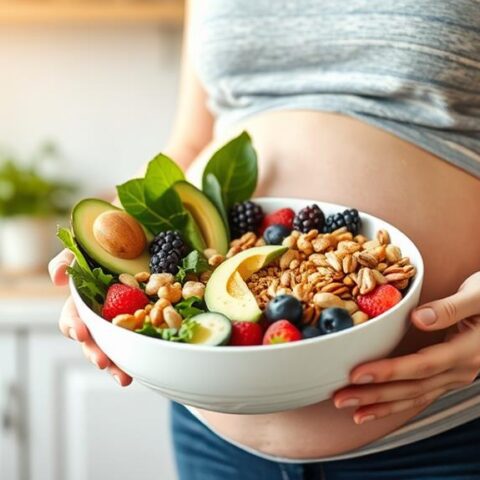
Velveeta is not ideal for a ketogenic diet due to its high carbohydrate content and processed nature. A 28g serving has about 10.7g of net carbs, which can quickly consume your daily carb allowance on a keto plan. Additionally, its use of canola oil and additives may negatively impact health by affecting cholesterol and potentially causing inflammation. For those following a keto diet, other cheese options like cheddar or cream cheese are more suitable, providing essential nutrients with considerably fewer carbs. Exploring these alternatives can enhance dietary compliance and promote better health choices.
Key Takeaways
- Velveeta has high carbohydrate content, approximately 10.7g per 28g serving, making it unsuitable for strict keto diets.
- The processed cheese's carb level can quickly exhaust daily keto carbohydrate limits, hindering ketosis.
- Opt for keto-friendly cheeses like cheddar or mozzarella, which have about 1g of net carbs per serving.
- High sodium in Velveeta raises health concerns, especially for individuals with hypertension.
- Focus on whole-food sources and healthy fats like avocado to maintain keto diet efficacy.
Understanding Velveeta Cheese
Velveeta cheese is a processed cheese product that is widely recognized for its smooth, creamy texture, which makes it a popular ingredient in culinary applications such as macaroni and cheese and various cheese dips. This product is crafted from a blend of cheeses, milk, and whey protein, supplemented with additives to enhance its flavor and extend its shelf life.
However, within the context of nutritional analysis, Velveeta presents certain characteristics that may be less than ideal for health-conscious consumers. A 28g serving of Velveeta contains approximately 10.7g of net carbs, mainly derived from milk sugars and various additives. This significant carbohydrate content classifies Velveeta as unsuitable for those adhering to a strict keto diet, where carbohydrate intake is meticulously monitored.
Much like sugary snacks and desserts, Velveeta's high carb content can disrupt ketosis. Additionally, Velveeta's nutritional profile is marked by a low protein content and the inclusion of unhealthy ingredients such as canola oil and modified starch. These components not only reduce its compatibility with ketogenic dietary principles but also raise concerns regarding overall health implications.
Therefore, when considering Velveeta as part of a balanced diet, it is essential to evaluate both its macronutrient composition and ingredient quality.
Keto Diet Basics
The ketogenic diet focuses on drastically reducing carbohydrate intake to approximately 20-50 grams per day, facilitating the body's change into a state of ketosis where fat becomes the primary energy source.
This shift necessitates a metabolic adjustment period that can take between 3-4 days, during which individuals may experience ketosis change symptoms such as increased thirst and fatigue.
In ketosis, the liver converts fats into ketones, which serve as an alternative fuel, especially for the brain and muscles.
This metabolic shift underscores the importance of carbohydrate restriction and highlights fat as the predominant component of the diet, aiming to support weight management and cognitive function.
Carbohydrate Restriction Importance
Carbohydrate restriction is a fundamental aspect of the ketogenic diet, which limits daily carbohydrate intake to a mere 20-50 grams to sustain ketosis—a metabolic state where the body primarily burns fat instead of glucose for energy. This carb allowance is vital in preventing blood sugar spikes and maintaining stable insulin levels, ultimately aiding in weight loss and improved metabolic health.
The ketogenic diet's macronutrient ratio highlights the necessity of monitoring carb intake, which consists of 70-75% fat, 20-25% protein, and only 5-10% carbohydrates.
While adhering to such restricted carb limits, individuals must be vigilant about their food choices, especially when it comes to processed foods, which often contain hidden carbohydrates and high sodium content. These factors can inadvertently increase daily carb intake and hinder the achievement of ketosis.
To effectively manage this, consider the following:
- Focus on Non-Starchy Vegetables: These are nutrient-rich and do not greatly impact your carb allowance.
- Avoid High-Carb Processed Foods: Opt for whole, unprocessed foods to minimize hidden carbohydrates.
- Monitor Sodium Intake: Processed foods often have high sodium content, which can affect overall health when consumed excessively.
Fat as Primary Fuel
Steering through the intricacies of the ketogenic diet extends beyond mere carbohydrate restriction, emphasizing the central role that fat plays as the primary energy source. The keto diet necessitates a substantial reduction in carbohydrate intake, limiting carbs to a mere 5-10% of daily caloric consumption. This shift forces the body into ketosis, a metabolic state where fat becomes the predominant fuel source, replacing glucose.
In this state, the liver metabolizes fatty acids into ketone bodies, which efficiently fuel the brain and other organs, aligning with the high fat content that defines a ketogenic lifestyle.
The macronutrient ratio fundamental to a keto diet typically comprises 70-75% fat, 20-25% protein, and minimal carbohydrates. This composition supports the body's changeover into ketosis, facilitating potential benefits such as improved insulin sensitivity, weight loss, and cognitive enhancement.
Culinary choices like creamy beef stroganoff can be adapted to fit this framework by ensuring a high fat content while minimizing carbs, thereby aligning with keto principles. By prioritizing fats, the ketogenic lifestyle underscores the significance of this macronutrient, ensuring sustained energy levels and promoting metabolic flexibility through ketosis.
Nutritional Breakdown of Velveeta
Examining the nutritional profile of Velveeta reveals a complex interplay of beneficial and less desirable components. Velveeta Cheese contains approximately 303 kcal per 100g serving, with notable amounts of macronutrients that impact dietary considerations.
The cheese's high processed nature is evident in its composition, combining significant levels of fats with a carb content of 9.8g per 100g serving. This net carb content poses a challenge for those adhering to ketogenic guidelines, which typically restrict daily carbohydrate intake to 20g-50g. Additionally, consuming high-carb foods like Velveeta can impact blood glucose levels, making it less ideal for those managing type 2 diabetes through a ketogenic diet.
From a nutritional standpoint, the cheese slices offer a protein content of 16.3g per 100g serving, which is advantageous for muscle maintenance and growth. However, Velveeta's high sodium level, at 1499mg per 100g, can be a concern, necessitating cautious consumption to avoid exceeding daily sodium recommendations.
Additionally, the cheese provides essential minerals that contribute to bone health, with calcium at 466mg and phosphorus at 863mg per 100g serving. Yet, these benefits must be weighed against the less favorable aspects of its nutritional profile.
The key components of Velveeta can be summarized as follows:
- High Carb Content: 9.8g per 100g serving.
- High Sodium: 1499mg per 100g.
- Rich in Calcium and Phosphorus: 466mg and 863mg per 100g, respectively.
Carbs in Velveeta
Velveeta cheese contains a significant carbohydrate content, with approximately 10.7g of net carbs per 28g serving, which can impede the ability to maintain ketosis for those adhering to a ketogenic diet.
The carbohydrates in Velveeta are mainly derived from milk sugars and additives, potentially causing a spike in blood sugar levels and quickly consuming the daily carb allowance for keto practitioners.
This higher carb content contrasts with the typical ketogenic dietary guidelines, which recommend keeping carbohydrates low to promote insulin regulation and appetite control.
For individuals seeking to stay within strict low-carb guidelines, exploring alternative cheese options with lower carbohydrate content is advisable.
High Carb Content
A significant concern for those adhering to a strict ketogenic diet is the high carbohydrate content found in Velveeta Cheese. With approximately 10.7g of net carbs per 28g serving, Velveeta's carb content stands in stark contrast to the daily carb limits recommended for maintaining ketosis. A typical keto diet encourages a daily intake of 20g to 50g of carbohydrates to maintain ideal blood sugar levels and promote ketosis.
The inclusion of ingredients such as maltodextrin and modified starch in Velveeta contributes to increased carbohydrate levels, potentially disrupting the keto diet's metabolic goals.
The implications of this high carb content are manifold:
- Dietary Constraints: For those on a keto diet, consuming Velveeta can easily exceed daily carb limits, compromising the dietary balance required for ketosis.
- Blood Sugar Impact: The carbohydrate composition can lead to spikes in blood sugar levels, counteracting the stabilizing effects desired in a keto regimen.
- Nutritional Goals: Velveeta's carb profile may hinder progress toward the high-fat, low-carb nutritional goals central to the ketogenic diet.
Ultimately, Velveeta's high carbohydrate content poses a significant challenge for individuals aiming to adhere to a keto lifestyle.
Impact on Ketosis
Given its substantial carbohydrate content, Velveeta poses a considerable obstacle for individuals committed to maintaining ketosis on a ketogenic diet. Velveeta cheese contains approximately 10.7g of net carbs per 28g serving. For keto dieters, who often restrict their daily carbohydrate intake to between 20g and 50g, this amount represents a significant portion of their daily carb allowance.
The high carb content in Velveeta can have a profound impact on ketosis, potentially hindering one's ability to remain in a fat-burning metabolic state. The primary carbohydrates in Velveeta derive from milk sugars and additives such as modified starch. These components can raise blood sugar levels, further complicating the maintenance of ketosis for those adhering to ketogenic principles.
Consuming Velveeta in substantial amounts can quickly exhaust the carbohydrate quota, posing a risk of exiting ketosis. The nutrient composition of Velveeta, characterized by a disproportionate ratio of carbohydrates to protein and fat, classifies it as an unsuitable cheese option for keto dieters.
The impact on ketosis is apparent, as the high carbohydrate content negates the metabolic benefits sought by those on a ketogenic diet. As a result, Velveeta should be avoided by individuals aiming to sustain ketosis.
Alternative Cheese Options
When exploring alternative cheese options for a ketogenic diet, focusing on their carbohydrate content is essential. Velveeta cheese, with its 10.7g of net carbs per 28g serving, is unsuitable for those adhering to the low-carb requirements of a strict ketogenic diet. This high carbohydrate content is attributed to milk sugars and additives like maltodextrin, which can raise blood sugar levels.
In contrast, keto-friendly cheese options such as cheddar, mozzarella, and cream cheese typically contain only 1g to 2g of net carbs per serving, making them more compatible with maintaining ketosis.
Processed cheeses like Velveeta often include unhealthy ingredients, such as canola oil, which hinder the goal of achieving a healthy, low-carb lifestyle. Instead, it is advisable to select cheeses from healthier sources that emphasize minimal processing and lower carbohydrate content.
Here are some keto-friendly cheese options:
- Cheddar: Contains approximately 1g of net carbs per serving and is derived from unprocessed, healthy sources.
- Mozzarella: Offers around 1g of net carbs, making it a suitable choice for keto dieters.
- Cream Cheese: With only about 1g net carbs, it serves as another excellent alternative.
Choosing these low-carb alternatives supports nutritional goals and enhances ketogenic dietary compliance.
Health Implications
Velveeta's nutritional composition raises considerable concerns regarding its suitability for a ketogenic diet. One of the primary issues is its net carbs content; with 9.8 grams per 100 grams, Velveeta greatly exceeds the typical daily carb limit of 20 to 50 grams for those following a strict keto diet. This high carbohydrate content can impede ketosis, the metabolic state essential for achieving weight loss and other health benefits associated with the ketogenic lifestyle.
In addition, the types of fats consumed on a keto diet are important; Velveeta contains unhealthy fats like canola oil which can negatively impact cholesterol levels. Moreover, Velveeta's sodium content is strikingly high, at 1499 milligrams per 100 grams. Such heightened levels of sodium pose potential risks, including increased blood pressure, especially with frequent consumption.
The presence of unhealthy ingredients like canola oil and modified food starch further complicates Velveeta's nutritional profile. These components may contribute to inflammation and other adverse health effects over time.
Additionally, Velveeta's overall nutritional profile, characterized by a high calorie count of 303 kcal per 100 grams and relatively low protein, fails to align with the nutritional optimization goals of those on a keto diet. Consequently, the consumption of Velveeta may hinder achieving the weight loss and health gains that ketogenic dieters typically pursue.
Keto-Friendly Cheese Options
In light of Velveeta's nutritional shortcomings, exploring alternatives that align better with ketogenic principles becomes essential. The keto diet emphasizes low-carb, high-fat content, and a variety of cheeses can meet these criteria while providing essential nutrients.
Including high-fat dairy options such as cheddar and mozzarella can enhance meal flavors and promote satiety, vital aspects of a successful keto diet. Cheddar cheese is a popular keto-friendly option, containing only about 1.3 grams of net carbs per 28-gram serving. Its versatility makes it suitable for various dishes, contributing to both flavor and nutritional value.
Mozzarella cheese, with approximately 1 gram of net carbs per ounce, is an ideal choice for keto pizzas and stuffed meals. Its mild taste and soft texture enhance meal diversity without the high carbs found in Velveeta.
Cream cheese, known for its smooth texture, typically contains around 1 gram of net carbs per ounce. This makes it suitable for desserts and savory sauces, providing a creamy element to keto recipes.
Other keto-friendly options include Parmesan and goat cheese, which have low carb content and distinctive flavors. These cheeses allow for culinary creativity while adhering to ketogenic dietary guidelines.
Cooking Without Velveeta
Crafting a delicious meal without Velveeta can be accomplished by utilizing keto-friendly cheese alternatives like cheddar, mozzarella, or cream cheese, which offer a lower carbohydrate content and better alignment with ketogenic dietary guidelines.
Cooking without Velveeta involves focusing on these low-carb cheeses to maintain the creamy texture and cheesy flavor that many dishes demand while adhering to a keto lifestyle. Incorporating healthy fats, such as olive oil or avocado oil, not only enhances the creaminess but also increases the nutritional value of your meals.
Homemade cheese sauces can be created by melting shredded cheese with heavy cream or butter, offering a rich consistency without the unnecessary additives of processed cheeses. This technique not only enhances the taste but also guarantees a dish remains within keto parameters. Nutritional yeast emerges as an exceptional substitute for achieving a cheesy flavor without the carbs, also providing a boost of B vitamins.
When preparing dishes like mac and cheese or cheese dips, integrating a mixture of low-carb cheeses and spices can replicate the desired flavor profile without Velveeta's carbohydrate impact.
Incorporating healthy fats, such as avocado or olive oil, further raises the creaminess and nutritional value, assuring the meal remains keto-friendly while enhancing overall taste and texture.
This approach to cooking without Velveeta allows for creative, nutrient-dense, and satisfying meals.
Expert Dietary Advice
How can one navigate the complexities of adhering to a ketogenic diet while considering cheese options like Velveeta?
Expert dietary advice suggests that Velveeta, with its 9.8g of net carbs per 100g serving, is not suitable for a strict keto diet, which typically limits carb intake to 20g to 50g per day.
Despite providing protein (16.3g) and calcium (466mg), Velveeta's high carb and sodium content (1499mg per 100g) pose significant dietary concerns.
Consuming processed foods like Velveeta can also lead to nutritional deficiencies, particularly in key micronutrients such as magnesium and potassium, which are crucial for maintaining hormonal balance.
To align with keto guidelines, consider these recommendations:
- Opt for Lower-Carb Cheeses: Cheddar, mozzarella, and cream cheese are preferable alternatives, offering essential nutrients without exceeding carb limits.
- Monitor Sodium Intake: Consider the cumulative sodium content in your diet to avoid potential health risks, especially if you have hypertension concerns.
- Evaluate Ingredients: Avoid processed cheeses containing canola oil and modified food starch, as these are not conducive to a healthy ketogenic lifestyle.
Frequently Asked Questions
Is Velveeta Cheese Ok for a Keto Diet?
Velveeta cheese, due to its high carbohydrate content, is not ideal for keto snacks or low carb meals. Opt for cheese alternatives like cheddar in creamy sauces for nutrient-focused Velveeta recipes that align better with ketogenic dietary guidelines.
How Many Carbs Are in Velveeta?
Velveeta contains approximately 10.7 grams of net carbs per 28-gram serving, due to milk sugars and modified starches. For cooking, consider its creamy texture and distinct taste. Explore various product varieties and serving suggestions for versatility.
What Kind of Cheese Is Keto-Friendly?
For a keto-friendly diet, cream cheese, cheddar varieties, and mozzarella options are excellent choices due to their low carbohydrate content. Consider cheese substitutes and dairy alternatives for those seeking additional options while maintaining nutritional balance and ketosis compliance.
Why Is Velveeta Not Cheese?
Velveeta is not classified as cheese due to its processed dairy status, incorporating food additives and modified starches. Its cheese alternatives labeling reflects its distinct melting properties and nutritional composition, which deviate from traditional cheese standards.
Conclusion
Velveeta cheese, with its high carbohydrate content, is not ideally suited for a ketogenic diet, which prioritizes low carbohydrate intake to achieve ketosis. Although Velveeta offers certain nutritional benefits, such as calcium and protein, its carb content outweighs these advantages for ketogenic adherence. Individuals following a keto diet may benefit from selecting alternative cheese options that provide similar nutritional benefits with markedly lower carbohydrate levels. Consulting a nutrition expert can offer tailored guidance for maintaining ketosis while enjoying dairy products.










No Comments